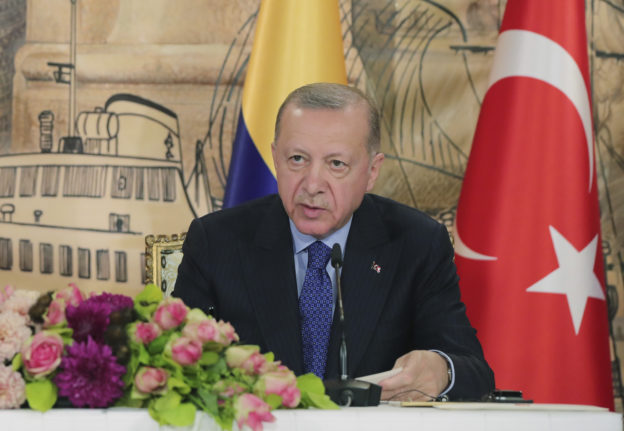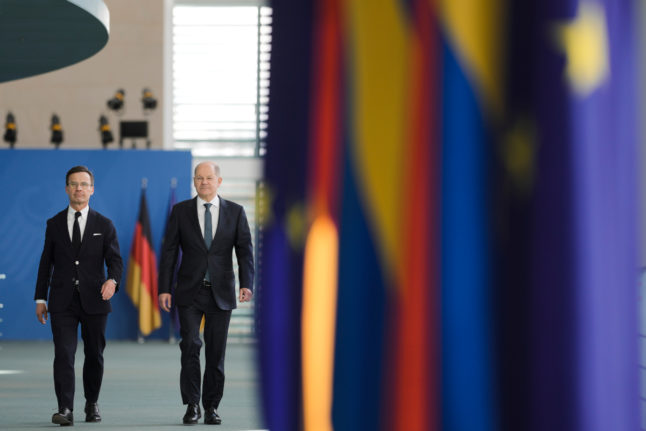Turkey has long accused Nordic countries, in particular Sweden which has a strong Turkish immigrant community, of harbouring extremist Kurdish groups as well as supporters of Fethullah Gulen, the US-based preacher wanted over the failed 2016 coup.
Erdogan’s threat throws a major potential obstacle in the way of the likely membership bids from the hitherto militarily non-aligned Nordic nations since a consensus is required in Nato decisions.
“Unless Sweden and Finland clearly show that they will stand in solidarity with Turkey on fundamental issues, especially in the fight against terrorism, we will not approach these countries’ Nato membership positively,” Erdogan told Nato chief Jens Stoltenberg in a phone call, according to the presidency.
On Twitter, Stoltenberg said he spoke with Erdogan “of our valued ally” on the importance of “Nato’s Open Door”.
“We agree that the security concerns of all Allies must be taken into account and talks need to continue to find a solution,” he said.
Spoke with President @RTErdogan of our valued Ally #Turkey on the importance of #NATO’s Open Door and the membership applications by #Finland & #Sweden. We agree that the security concerns of all Allies must be taken into account and talks need to continue to find a solution.
— Jens Stoltenberg (@jensstoltenberg) May 21, 2022
On Thursday, Stoltenberg said Turkey’s “concerns” were being addressed to find “an agreement on how to move forward”.
Erdogan, who refused to host delegations from Sweden and Finland in Turkey, held separate phone calls with the two countries’ leaders on Saturday, urging them to abandon financial and political support for “terrorist” groups threatening his country’s national security.
He told Swedish Prime Minister Magdalena Andersson that “Sweden’s political, financial and arms support to terrorist organisations must end”, the presidency said.
Turkey expects Sweden to “take concrete and serious steps” that show it shares Ankara’s concerns over the outlawed Kurdistan Workers’ Party (PKK) and its Iraqi and Syrian offshoots, Erdogan told the Swedish premier, according to the presidency.
The PKK has waged an insurgency against the Turkish state since 1984 and is blacklisted as a “terrorist organisation” by Turkey and Western allies like the European Union — which includes Finland and Sweden.
‘Incompatible’
Russia’s invasion of Ukraine in February has shifted political opinion in both Nordic countries in favour of joining the Western military alliance.
Membership requires consent of all 30 existing members but Turkey is putting a spanner in the works.
Sweden and Finland, while solidly Western, have historically kept a distance from NATO as part of longstanding policies aimed at avoiding angering Russia.
But the two nations moved ahead with their membership bid, in shock over their giant neighbour’s invasion of Ukraine, which had unsuccessfully sought to join NATO.
Erdogan also told Andersson to “lift restrictions imposed on Turkey in the defence industry” after the army’s Syria operation in 2019.
In another phone call with Finnish President Sauli Niinisto, Erdogan said turning a blind eye to “terror” organisations posing a threat to a Nato ally was “incompatible with the spirit of friendship and alliance.”
Erdogan also said it was Turkey’s most natural right to expect respect and support for its “legitimate and determined struggle against a clear threat to its national security and people”, the presidency said.
Swedish and Finnish leaders on Thursday were welcomed by US President Joe Biden, who strongly backed their bid to join Nato.
Biden said “Finland and Sweden make Nato stronger”, and offered the “full, total, complete backing of the United States of America.”
READ MORE:
Turkey ambassador suggests extradition of Swedish member of parliament



 Please whitelist us to continue reading.
Please whitelist us to continue reading.
Sweden can not meet all these demands , and the President of Turkey knows it , so it’s just two fingers to the Swedish Government or Up Yours Turkish Style .